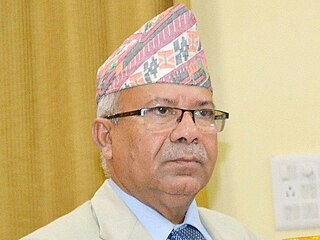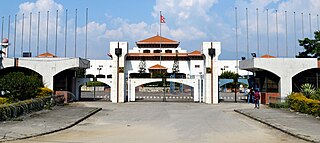This article needs to be updated.(July 2019) |
The All-Nepal Women's Association (Revolutionary) (ANWA[R]) is a Nepalese women's political organization that is aligned with the ruling Communist Party of Nepal (Maoist). [1] [2]
This article needs to be updated.(July 2019) |
The All-Nepal Women's Association (Revolutionary) (ANWA[R]) is a Nepalese women's political organization that is aligned with the ruling Communist Party of Nepal (Maoist). [1] [2]

Nepal is a multi-ethnic, multiracial, multicultural, multi-religious, and multilingual country. The most spoken language is Nepali followed by several other ethnic languages.

The current population of Nepal is 29,164,578 as per the 2021 census. The population growth rate is 0.92% per year.

Pushpa Kamal Dahal, alias Prachanda, is a Nepalese politician currently serving as the Prime Minister of Nepal. He previously held the prime ministerial post from 2008 to 2009 as the first prime minister of the Federal Democratic Republic of Nepal, and again from 2016 to 2017. He was elected as prime minister for the third time in 2022, following that year's elections.

The Communist Party of Nepal (Maoist Centre) (Nepali: नेपाल कम्युनिस्ट पार्टी (माओवादी केन्द्र)), abbreviated CPN (Maoist Centre), CPN-Maoist Centre, CPN Maoist Centre, or CPN (MC), is the third largest political party in Nepal and a member party of Samajbadi Morcha. It was founded in 1994 after breaking away from the Communist Party of Nepal (Unity Centre). The party launched an armed struggle in 1996 against the Nepalese government. In 2006, the party formally joined mainstream politics after signing a peace agreement following the 2006 Nepalese revolution.

The Communist Party of Nepal (Unified Marxist–Leninist) (Nepali: नेपाल कम्युनिष्ट पार्टी (एकीकृत मार्क्सवादी-लेनिनवादी), romanized: nēpāla kamyuniṣṭa pārṭī (ēkīkr̥ta mārksavādī-lēninavādī); abbr. CPN (UML)) is a communist political party in Nepal. The party emerged as one of the major parties in Nepal after the end of the Panchayat era.

Madhav Kumar Nepal, is a Nepalese politician and former Prime Minister of Nepal. He served as Prime Minister of Nepal from 25 May 2009 to 6 February 2011 for nearly two years.

The House of Representatives, or Pratinidhi Sabha, is one of the houses of the Federal Parliament of Nepal, with the other house being the National Assembly. Members of the House of Representatives are elected through a parallel voting system. They hold their seats for five years or until the body is dissolved by the President on the advice of the council of ministers. The house meets at the International Convention Centre in Kathmandu.

In 2022, Freedom House rated Nepal’s human rights at 57 out 100, determining the country's status in terms of fundamental freedoms as "partly free".

The Federal Parliament of Nepal is the bicameral federal and supreme legislature of Nepal established in 2018. It consists of the National Assembly and the House of Representatives as parallel houses.

The Nepalese democracy movement was the combination of a series of political initiatives and movements from the 20th century to 2008 that advocated the establishment of representative democracy, a multi-party political system and the abolition of monarchy in Nepal. It has seen three major movements, the Revolution of 1951, Jana Andolan and Loktantra Andolan which ultimately abolished the Shah monarchy, transitioned Nepal towards a republic and reintroduced multi-party bicameral democracy.
Madheshi people is a term used for several ethnic groups living in the central and eastern Terai region of Nepal. It has also been used as a political pejorative term by the Pahari people of Nepal to refer to non-pahari people with a non-Nepali language as their mother tongue, regardless of their place of birth or residence. The term Madheshi became a widely recognised name for Nepali citizens with an Indian cultural background only after 1990. Madheshi people comprise various cultural groups such as Hindu caste groups, Muslims, Marwaris, Brahmin and Dalit caste groups, ethnic groups like Maithils, Bhojpuri, Awadhi and Bajjika speaking people and indigenous people of the Terai. Many of these groups share cultural traditions, educational and family ties with people living south of the international border in Bihar, Uttar Pradesh and West Bengal. Tharu people and Pahari people living in the Terai do not consider themselves as Madheshi. In recent times, some politicians and journalists use the term for all Nepali citizens of the Terai.

Constitution of Nepal 2015 is the present governing Constitution of Nepal. Nepal is governed according to the Constitution which came into effect on 20 September 2015, replacing the Interim Constitution of 2007. The constitution of Nepal is divided into 35 parts, 308 Articles and 9 Schedules.

General elections were held in Nepal from 18 February to 3 April 1959 to elect the 109 members of the first House of Representatives, the lower house of the Parliament of Nepal. They were held under the provisions of the 1959 constitution, which had been adopted on 12 February. More than 4.25 million people out of an overall population of about 8.55 million (1954) were eligible to vote. Voter turnout was 42.18%.
The Revolutionary Internationalist Movement (RIM) was an international communist organization founded in France in March 1984 by 17 various Maoist organizations around the world. It sought to "struggle for the formation of a Communist International of a new type, based on Marxism–Leninism–Maoism". The RIM appears to be defunct as are many of the founding organizations and many changed their names over the years, or have dropped active armed struggle.
Ethnic federalism, multi-ethnic or multi-national federalism, is a form of federal system in which the federated regional or state units are defined by ethnicity. Ethnic federal systems have been created in attempts to accommodate demands for ethnic autonomy and manage inter-ethnic tensions within a state. They have not always succeeded in this: problems inherent in the construction and maintenance of an ethnic federation have led to some states or sub-divisions of a state into either breaking up, resorting to authoritarian repression, or resorting to ethnocracy, ethnic segregation, population transfer, internal displacement, ethnic cleansing, and/or even ethnicity-based attacks and pogroms.
Gender inequality in Nepal refers to disparities and inequalities between men and women in Nepal, a landlocked country in South Asia. Gender inequality is defined as unequal treatment and opportunities due to perceived differences based solely on issues of gender. Gender inequality is a major barrier for human development worldwide as gender is a determinant for the basis of discrimination in various spheres such as health, education, political representation, and labor markets. Although Nepal is modernizing and gender roles are changing, the traditionally patriarchal society creates systematic barriers to gender equality.
Women were a significant group who were involved in the Maoist movement during the Nepalese Civil War, which refers to a violent insurgency that took place from 1996 to 2006. The insurgency was led by the Communist Party of Nepal (Maoist) (Nepali: नेपाल कम्युनिष्ट पार्टी, or CPN with the aim of establishing a People's Republic and ending the rule of the Nepalese Monarchy. During this time, over 13,000 civilians and public officials were murdered, approximately 200,000 were displaced, and numerous others were tortured, extorted, and intimidated. Although the majority of Maoist insurgents were men, the Maoist Party claimed that up to 40 percent of their 19,000 combatants were women. This was regarded as an unprecedented move at the time, given that women were forbidden from fighting in the Nepalese Army until 2003.

General elections were held in Nepal in two phases on 26 November and 7 December 2017 to elect the 275 members of the fifth House of Representatives, the lower house of the Federal Parliament of Nepal.

Dalit feminism is a feminist perspective that includes questioning caste and gender roles among the Dalit population and within feminism and the larger women's movement. Dalit women primarily live in South Asia, mainly in Bangladesh, India, Nepal and Pakistan. Dalit women face different challenges than women in oppressor castes in these countries. They are more likely to be poor, uneducated and socially marginalized. Dalit feminists advocate and have advocated for equal rights for Dalit women based on gender, caste and other issues. They have addressed conferences, created organizations and helped elect other Dalit women into political office.

The Rastriya Swatantra Party is the fourth largest political party in Nepal. It remained as a junior ally in Prachanda-led government from 26 December 2022 until 5 February 2023. While it called back its members from the current coalition government arrangement, it continues its support to the government since 5 February 2023.